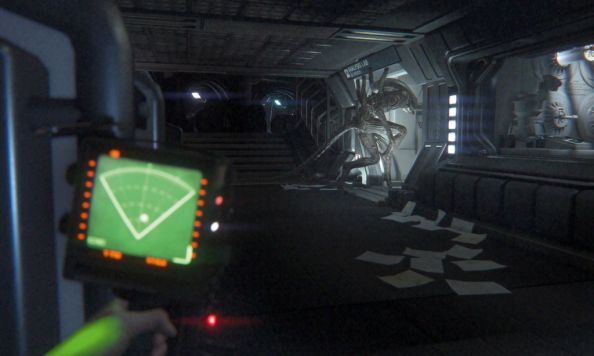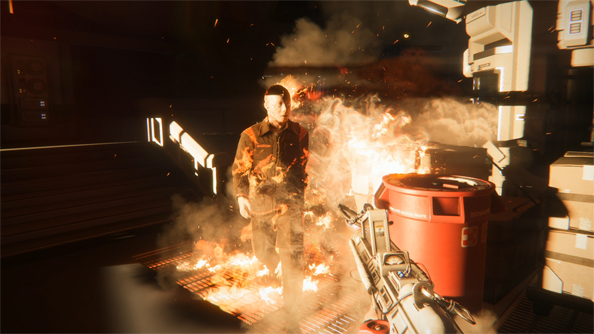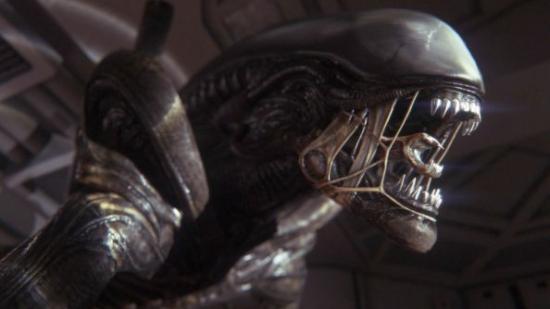The pitch read like an inevitable disaster: development studio known for only making RTS games to create a first-person horror with only one enemy, based on the film Alien. Not only that, but it was to release in the year following publisher Sega’s last Aliens effort, the abysmal Colonial Marines. Things weren’t looking good for Alien: Isolation.
Related: here are the best horror games on PC.
Creative Assembly absolutely pulled through, though. Alien: Isolation is a tense and terrifying triumph; an immersive trip into director Ridley Scott’s 1979 vision of a cruel, industrial future. It is, without question, my favourite game of 2014.

Games have never had an easy relationship with film. Until now I couldn’t name a genuinely brilliant game based on a movie. But Alien: Isolation is painted in the blood that pumps from the hearts of a team that are in love with the original Alien film. From the scan-line covered 1970s 20th Century Fox logo, through the menu scored with the original soundtrack, to the moment you walk into the medical bay that’s a clone of the film’s in both look and feel, Isolation is the absolute perfect recreation of Alien’s world. The corridors feel cramped because they’re the right size for humans, not for videogame shoot-outs. The lighting flickers on and off as you pass through to save on power. Monitors and equipment click and hum with a beautifully familiar melody. If it weren’t for the barrier between screen and virtual world, you’d actually be on set as Ridley Scott rolled the cameras.
It’s not just Creative Assembly’s attention to the details of the world that make Isolation the terrific game that it is, though. It’s the translation of the film’s pace. In Alien, the xenomorph creature itself doesn’t appear until almost an hour in. Similarly, the alien doesn’t appear in Isolation until you’ve been exploring the sprawling Sevastopol space station for a similar amount of time. And from there on, the pacing never fails to be anything but perfect. Extended sessions of terror as the xenomorph stalks you through rooms, lockers, and vents, spaced out with equally lengthy chapters of puzzle solving, exploration, and dealing with the other less-frightening-but-equally-deadly threats aboard the station.
So how about that xenomorph, then? It is, afterall, the centrepiece of the game. Creative Assembly promised a lot of their AI: that it would be unlike anything we’ve seen before. They delivered. During my playthrough I never saw the xenomorph as a piece of software; it genuinely felt aware. Its stalking patterns felt natural, its actions completely unpredictable. When it finally discovered who I was, it began to do something terrifying: it learnt. For most of the game I escaped into vents unhindered, but later on I dived into a manhole in full sight of the creature. Suddenly it realised how I’d been getting around the ship, and knew how to combat me. And as I heard a rattle in the ducts ahead of me, I knew what had happened. It was in the vents with me, and my last hope of survival had gone.

Well, not quite. There’s a fun little parallel with XCOM in Alien: Isolation. Late in XCOM’s campaign you start to gain astonishingly powerful weapons that suddenly make your alien adversaries look like school children. There’s a similar point in Isolation, when the game awards you the franchise’s iconic flamethrower. The xenomorph hates it, and hisses in anticipation as you wave the fiery muzzle in its direction. Pull the trigger and it’ll thunder off in a shriek of fear. It’s not enough to kill it, but suddenly you have the ability to move much freer, knowing you can push the bastard back. It changes the mood of the game; you’re still scared, but your relationship with the xenomorph has evolved. Provided you can see it before it sees you, you can be in control.
The combination of tension-building, fear, catastrophic incidents, and detailed locations makes Alien: Isolation a deeply cinematic game. But despite the linear narrative, it’s a game that feels unscripted and entirely your own journey. It’s a game of constant decisions; hide or run, fight or flee. It’s a game that rewards patience and effective moment-to-moment choices, but ensures that’s always a challenge as its monster breathes down your neck. Making it to the credits feels an achievement. And when I got there I finally had time to reflect on what kind of achievement Alien: Isolation is for Creative Assembly. I think they’ve developed some very important technology that we’ll be seeing again. I think they’ve cracked atmosphere in a way that so few other games have managed. And I think they’ve made the best game of the year.
